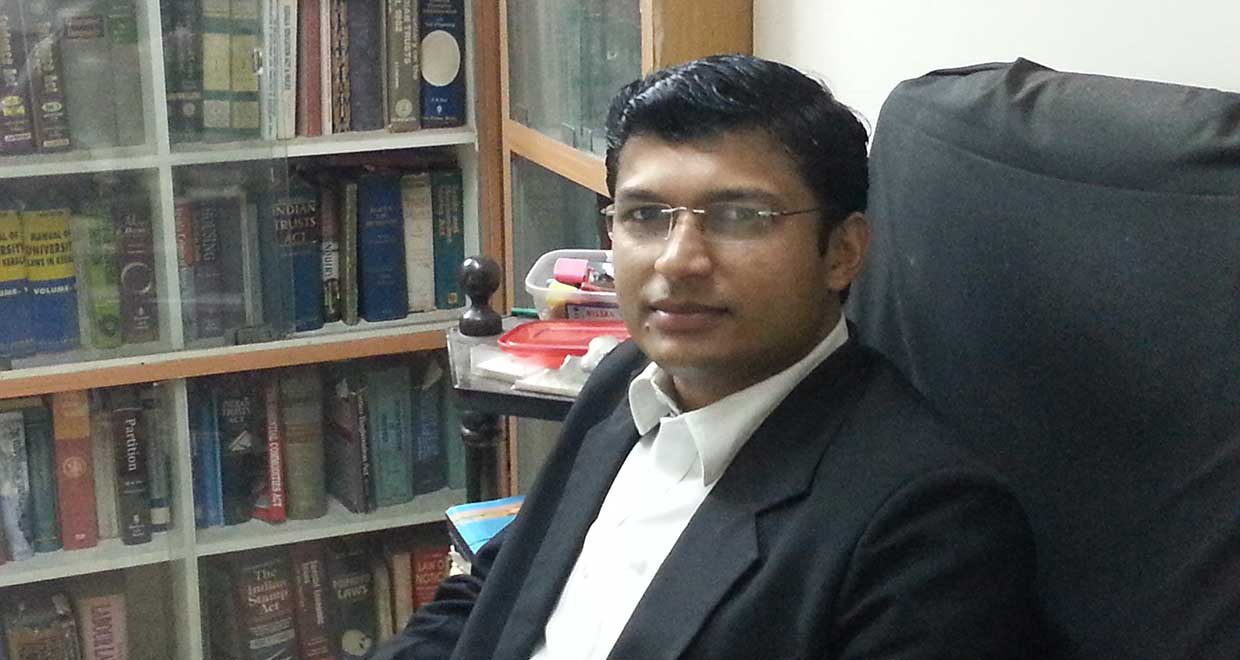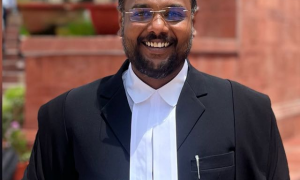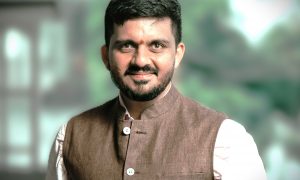Nelson Joseph graduated from Government Law College, Ernakulam (2003-2007). He is a Civil-Corporate Lawyer who practices at High Court of Kerala and various other Courts, Tribunals and Commissions in Kerala and in other southern states. A first generation lawyer from an agricultural family, he began his career in 2007 at Radhakrishnan & Co., a leading civil-corporate law firm in Kochi which has operations in entire south India. He presently holds the position of Senior Associate Lawyer in the firm. His areas of interest pertain to Civil Litigation, Real Estate Laws, Banking Laws (legal opinions, legal due diligence and litigation), Customs Law, Commercial and Corporate matters etc.
In this interview he talks to us about:
- Challenges faced by him to complete his LL.B.
- Difficulties faced by him to find a good law firm.
- Skills to be developed by a law student to succeed in the field of litigation.
- How he keeps himself updated with the legal knowledge.
Tell us a bit about your childhood and pre-college life as well as educational background.
I hail from a rural agricultural family in Ldukki District of Kerala. My life took a turn when I got admission to Jawahar Navodaya Vidyalaya in 6th grade. Ever since, I have been away from my native place. Meanwhile I completed my B.Com, LL.B and LL.M. from Mahatma Gandhi University, Kerala.
As you were not from a wealthy background, what were the challenges you faced to complete your LL.B?
It was never a childhood dream of mine to become a lawyer. In addition to that, I did not come from a financially sound family. Consequently, LL.B was the only professional course which I could enroll to, without troubling my parents. For completing my LL.B course, I supported myself by indulging in part time jobs, which gave me sufficient life experiences to thrive on the later period of my career. For instance, those employers for whom I worked with have become my clients now thereby making me realize that through every pain, we gain something and those struggles were great opportunities for me.
So when did you realize that law is your career?
While doing LL.B., I was not so particularly inclined to become a litigating lawyer. Although I tried my hand in attempting various competitive exams including civil service exam and searching for jobs, experiencing slips between the cup and the lip, words of my mother that “the almighty has a great plan for you” (which she quoted from The Holy Bible), kept me motivated. As a result, I believe that whenever I lose an opportunity, it has always been for something better. Despite seeing my class mates drop out for various reasons such as getting married or obtaining jobs, the motivation to sustain along with the course was always given by professors such as Mr. Paul Gomez who used to tell us that, “LL.B is a magic key, you don’t know when and where you are going to find the treasure box, so keep the key with you oiled and sharpened”. After joining Radhakrishnan & Co. as a junior Associate I realized my passion and flair lies in law.
What difficulties did you face finding a good law firm and starting your practice?
Being a first generation lawyer, I had to find out a good office to start my practice, which was not an easy task. In addition to that, it was very hard to survive with the meager salary offered to junior advocates by most offices. Finally, I could manage to find a firm where I would get some money for my survival and without much thought, I joined there immediately. Eventually I realized that it was one of the leading firms in South India which dealt with all domains of legal works and I was mesmerized with the kind of exposure I could get there.
Without any God Fathers, how difficult it was for a first generation lawyer like you to survive?
I was fortunate enough to have two wonderful seniors in the office. Adv. P. Radhakrishnan is gem of a person and a well-respected legal luminary in the state. His doors are always open for us juniors to approach with all kinds of doubt. He has been a study material for us to learn all professional qualities required for a man of law. Adv. Madhu Radhakrishnan, an alumnus of the NLSIU Bangalore, is person with lot of wisdom and empathy. He motivates me to stick on to this noble profession. His brotherly concern is not only limited to my career, but also spans across personal matters as well.
It doesn’t matter whether you are a first generation lawyer or you belong to a lineage of lawyers. The difference is only at the beginning stage to find out a good office and the rest depends on the effort and hard work one put into it. As it is said, smooth sea never made a skilled sailor. There is nothing like adversities. Everything is an opportunity and its attitude that matters.
How and when should a young lawyer decide to begin his own practice?
I cannot answer this question fairly as I have not started my independent practice. The kind of exposure we get while working in a firm will be different while practicing independently. There are no rules for how and when to start own practice. There are lawyers who start their career by own practice and there are the others who are attached to firms throughout their career. It’s a personal choice which depends on so many other factors as well.
What types of skills should a law student strive to develop while in law school to succeed in the field of litigation?
What we study in law school and what we practice in court are entirely different. For a litigating career, important skills one should possess are drafting skills, a good command over language and the meticulous way of observation of minute things. These can be developed during the college days. Furthermore, a lawyer should be a good content writer too. Other skills such as court craft and art of advocacy will be attained while practicing. Advocacy is an art of persuasion which can be learned by constant observation of eminent seniors. It’s not about skills; rather it’s all about the qualities lawyers possess. As lawyers’ creed says, “know your manners, tell the truth and know the law”.
Please share with us your areas of practice.
The firm which I work for is a client based firm rather than a subject based firm. So, all of that depends on the legal requirement of our client. For our clients, our office is like a single window system. Therefore the degree of exposure one gets here is really high. Because of this multi-disciplined and general practice, our services span across Munsiff’s courts, High Court, Tribunals and Commissions.
How do you make new clients and retain them?
Usually a lawyer gets clients through reference. Moreover, effective networking and good results are the key elements to get cases in. Since most of our clients are large corporate entities, it’s easy to get new clients, as the legal and other officers keep switching companies frequently. If the officers who are dealing with the law firm are satisfied, they will come back to us when they join other companies too.
Everybody at some point of time in their life will find the need of a lawyer. So be polite but firm to people and make them feel that we are approachable and trustworthy. Clients will come naturally.
For retention of corporate clients, more than producing results, we have to be proficient in soft skills, should possess good professionalism and proper updating of case status. Companies change their lawyers not because of poor results, but because of poor soft skills. Indeed, the law firms should adapt to the technological shifts. For instance, client companies expect an email update in the evening of the case date and also appropriate electronic documentation.
You practice both in High Court and Trial Courts. Which is more difficult?
High Court practice and lower court practice are different entities. In the High Court, our argument should be very precise and to the point. Whereas in Trial court, we need to do in depth study and preparation as it is where we make the foundation of the case. We should be extremely careful while drafting a plaint. On the contrary, High Court practice is comparatively easier as the procedures are simple and will get immediate results. In High court we need to show more court craft and advocacy as we get limited time to convince the judge. But the satisfaction of extracting the desired answers from the witness during cross examination could only be obtained from a trial court.
Now a law graduate can become a judge directly from law school without any practice. What is your viewpoint on it?
In present age, majority of students from elite law schools either appear for judicial services exam or opt for campus placement in companies immediately after the course. I would like to suggest that it is better to choose either one of the above mentioned options, after having some practical experience as a lawyer.
It is very important for a judge to have some experience of getting a brief, conducting a case, technicalities associated with it for a better deliverance of judgment. Therefore in the interest of all, the minimum of 3 year practice as lawyer should be made mandatory for becoming a judicial officer.
How do you keep yourself updated with the legal knowledge?
I think one should clearly set out the working hours in such a way that it contributes in updating knowledge. As a rough formula, I would suggest, one may dedicate 75 % of the work time for actual works for the clients, 15% for continuing legal education reading journals, writing articles, attending seminars and workshops etc. and the remaining 10% for networking and finding new clients online and offline. As an example, I usually attend seminars and workshops conducted by National Law schools and other institutions to get myself updated in the profession.
Does the college where we study really matters in the litigation career and if yes, how?
The students from elite Law schools are better equipped and, of course, will have an advantage at the start of their career. They can easily get into big firms. But in long run, the school we studied and the marks we scored have no relevance. What matters is how hard and intelligently we work.
What are the areas do you think needs improvement for yourself?
I need to find more time for general reading than the journal readings. Together with that, I also want to reduce or rather detach my personal emotional element from a case. As I am a very sensitive person, sometimes I become too emotional and identify myself with the client, which affects the professionalism.
People say, a lawyer has to sacrifice his personal and family life to become successful in career. How do you think about it considering the hard work involved in building a career?
It is true that one has to put the blood and sweat into it to become successful in the career. There is no substitute for hard work. If I modify the quote of Longfellow in the context of our profession, then it could be stated as “Great lawyers won cases and attained fame by studying cases late night, while their opponents slept.” It does not imply that personal life will be affected in turn but it’s all about time management.
What would be your advice to our readers?
I don’t think I have reached anywhere to advice the readers who are much better than me in their insights and knowledge. But I shall share few of my thoughts I like reminding myself often for my improvement.
- Never feel ashamed to ask questions and doubts – We are not doing anything original. We are just following what our seniors and earlier generation did with some modifications. So when we get a case on new subject, feel free to ask our doubts to lawyers who handle similar cases and obtain copies of draft from them for our easiness.
- “If somebody offers you an amazing opportunity but you are not sure you can do it, say yes – then learn how to do it later”. – Richard Branson. In legal practice, there is nothing, which is hard to crack. Take whatever matters come to you. With a little research and advice, we can easily do it and become an expert in it soon. But make sure not to mess up and loose the confidence of the client.
- Be visible, regular and trustworthy. People are not looking for the best lawyer in the country, but a lawyer who is accessible and whom they can trust.


























